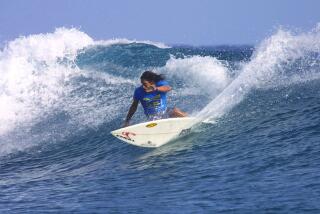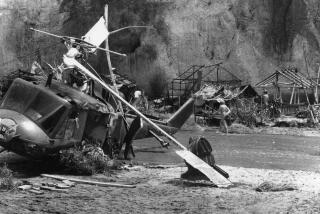Jury Absolves Lifeguards of Liability in Surfer Death
- Share via
Brian Brokaw’s parents lost their wrongful-death suit against the state and Carlsbad State Beach lifeguards, but their attorney said after the verdict that they gained what they had set out to do: to alert the state and the local community to the dangers of mixing lobstering and surfing.
Brokaw drowned Oct. 4, 1985, when the leash that attached his surfboard to his ankle became entangled in a lobster trap buoy line that had been washed by storm waves into the surfing area off the popular Carlsbad surf spot.
His parents, Nelda DeVroeg and Charles Brokaw, had sought $1.5 million for the loss of their son, but their attorney, Dennis Schoville, said after the jury verdict that that was not their major aim.
“We are disappointed in the verdict but that was not the main purpose of Brian’s parents,” Schoville said.
Schoville sought to show that the lifeguards at the beach should have anticipated that strong storm waves might uproot some of the dozens of lobster traps that had been planted on a reef beyond the surfing area. He cited a similar death in Imperial Beach a year before, when a surfer’s leash became entangled in lobster trap lines.
Jurors found, by a 10-2 vote, that there were dangerous conditions existing on the day Brokaw died, but also found by a 10-2 vote that the dangerous conditions--the lobster trap lines within the surfing area--could not have been anticipated by lifeguards.
Brokaw, who was from Escondido, and a number of other surfers had been surfing off the Carlsbad beach since about 5:30 a.m. the morning he died. He told buddies that he was tired and was heading for shore shortly before his body was discovered drifting under the water, his surfboard bobbing on top.
When rescuers reached him, they found that his surfboard leash had wrapped around ropes that held floating buoys that mark the site of the submerged traps.
During the trial, other surfers testified that the buoys on the dislodged traps were clearly visible and that they had surfed around and through the buoys without considering them dangerous.
Lifeguards, who were just coming on duty when Brokaw’s body was spotted, attempted to revive the surfer but were unsuccessful.
Assistant Atty. Gen. Karen Walter, representing the state, pointed out that signs posted along the beach warned the surfers that no lifeguards were on duty in the early morning hours and that they entered the water at their own risk. She also attempted to show that Brokaw probably was unconscious when his surfboard leash became entangled in the buoy lines or he would have released the tether on his ankle.
More to Read
Sign up for Essential California
The most important California stories and recommendations in your inbox every morning.
You may occasionally receive promotional content from the Los Angeles Times.













